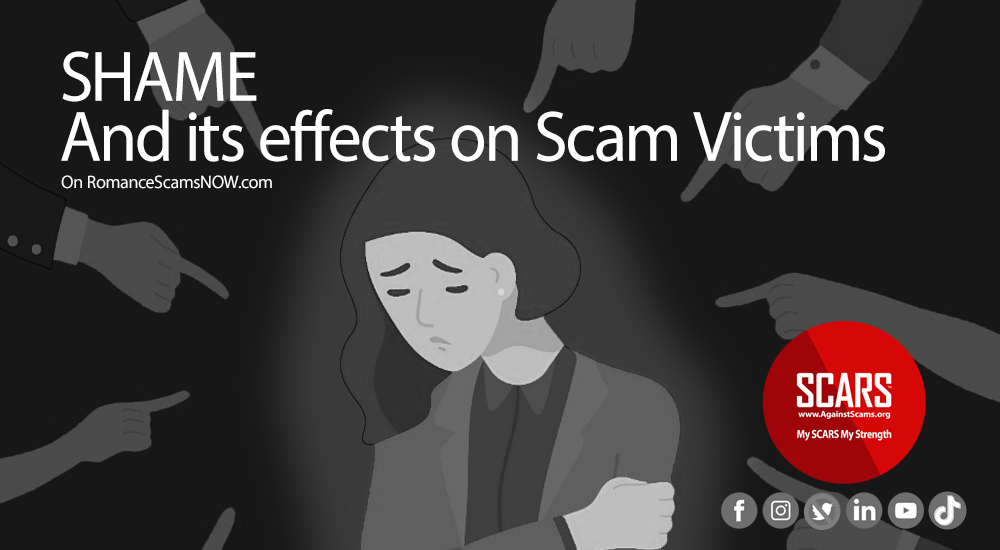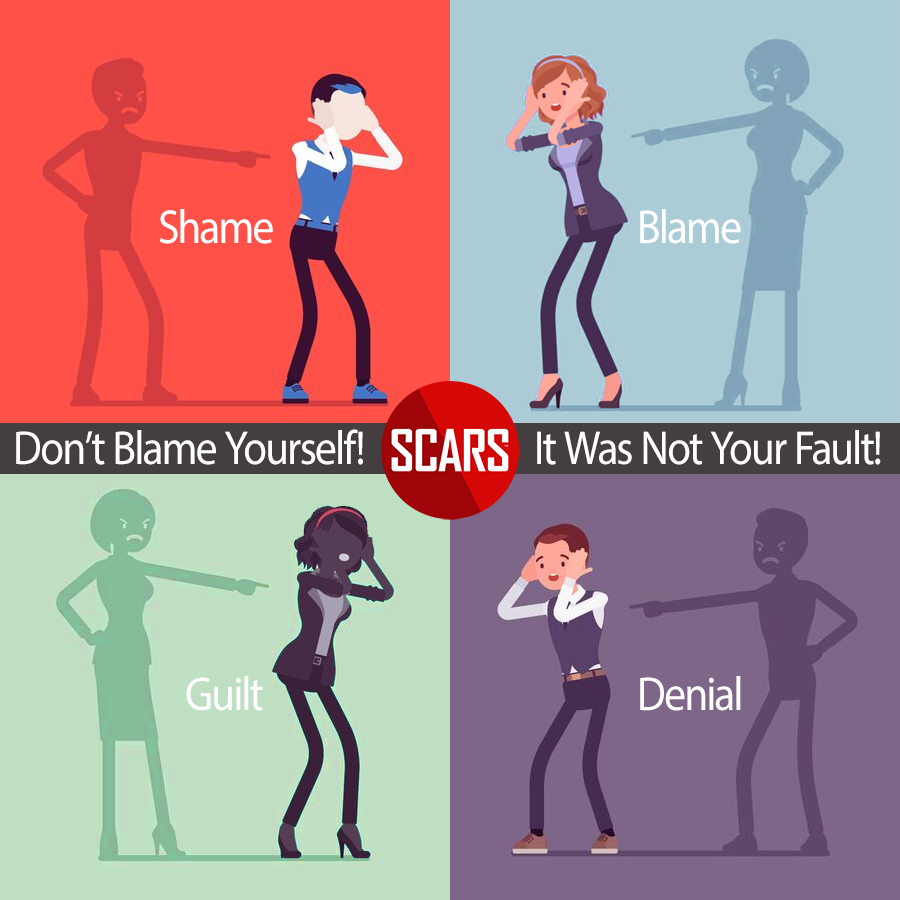
SCARS Institute’s Encyclopedia of Scams™ Published Continuously for 25 Years

No Scam Victim Should Ever Feel Shame, Yet Most Do!
Part of it is the event, part is their failure to act against the scam! Most scam victims never even report the scam or the scammer, instead they living in a partial state of denial while their anger or depression takes control.
You Should Feel No Shame At All!
If you did these things you deserve a pat on the back, you did the right things! Be proud!
- You Ended the Scam/Crime
- You Blocked the Scammer/Criminal
- You Reported the Crime Properly to Your Local & National Police
- You Found Help to Recover
Living With Shame
But if you are living with these, then shame is controlling your life! Stop It and Take Control!
- Are You Denying the Truth?
- Are You Still Talking to the Scammers/Criminals?
- Did You Ever Report the Crime?
- Did You Never Look for Help?
NEVER FEEL SHAME!
DO THE RIGHT THINGS NOW!
Why Do Scam Victims Feel Shame After The Scam Ends?
Scam victims may feel shame after the scam ends for a variety of reasons. Here are some possible explanations:
Scam victims may feel that they were gullible or foolish for falling for the scam. They may believe that they should have been able to recognize the scam and avoid it. This self-blame can lead to feelings of shame and embarrassment.
There is still a stigma attached to being scammed. Victims may worry that others will judge them harshly for having been scammed, viewing them as naive or foolish. This can lead to feelings of shame and a reluctance to share their experience with others.
Scam victims often feel a sense of loss of control over their lives. They may feel that they have been taken advantage of and that they were powerless to prevent it. This loss of control can lead to feelings of shame and vulnerability.
Scams can often lead to significant financial losses, which can be a source of shame for victims. They may feel embarrassed that they were unable to protect their finances or that they have been left in a difficult financial situation.
Scam victims may worry that others will judge them negatively for having been scammed. They may fear that others will see them as vulnerable or as an easy targets for scammers. This fear of judgment can lead to feelings of shame and a reluctance to seek help or support.
It’s important to remember that being scammed is not a reflection of the victim’s intelligence or worth. Scammers are skilled at manipulating people and using tactics to deceive even the most savvy individuals. It’s important for victims to seek support and assistance, rather than feeling ashamed or embarrassed about what has happened.
Feeling Shame If You Have Not Reported The Crime
Scam victims may still feel shame because they have never reported the scam to the police for several reasons:
Because the victim hasn’t reported the scam, they feel that they should have been able to report the crime and help prevent others from becoming victims.
Scam victims may feel shame about how others will perceive them if they reveal that they never reported the crime to their police. They may fear that others will see them as letting the scammers win. This fear of judgment can lead to feelings of shame and embarrassment.
How Can Reporting Scams To The Police And Taking Back Control Help Scam Victims To Avoid Shame And Guilt Over These Crimes?
Reporting scams to the police and taking back control can help scam victims avoid feelings of shame and guilt for several reasons:
Empowerment: By reporting the scam to the police, victims can take back some sense of control and empowerment. It can be a positive step towards actively addressing the situation and taking action against the scammers, rather than feeling helpless and ashamed.
Validating the victim’s experience: Reporting the scam can help victims feel validated and heard. They may feel less alone in their experience and less isolated in their shame or embarrassment.
Raising awareness: Reporting the scam to the authorities can help raise awareness of the scam and prevent others from falling victim to it. By taking action, victims can help prevent others from experiencing the same scam and can prevent the scammers from harming other people.
Accessing support: Reporting the scam can also connect victims with support services that can help them recover from the experience. These services can help victims address their feelings of shame or guilt, provide them with practical assistance, and help them to recover financially and emotionally.
Reporting scams to the police can be an important step toward healing and recovery for scam victims. It can help them to take back control and feel empowered and can provide them with access to the support and resources they need to move forward from the experience.
Learn More:
- 3 Steps For New Victims
- Urgent Next Steps
- Why Reporting Matters?
- What Every Victim Needs To Understand
- Reporting Scams & Interacting With The Police – A Scam Victim’s Checklist [VIDEO]
- Next Steps – Protect Your Financial Identity
- From Victim To Survivor
- Reporting Scams To The United States Secret Service – Cryptocurrency Recovery – Forget The FBI! [VIDEO]
- How To Effectively Follow Up – Scams and the Local Police
- Reporting Scammers – How To Tell Your Story To Your Local Police!
- A Quick Reminder To Report All Scams
Statement About Victim Blaming
SCARS Institute articles examine different aspects of the scam victim experience, as well as those who may have been secondary victims. This work focuses on understanding victimization through the science of victimology, including common psychological and behavioral responses. The purpose is to help victims and survivors understand why these crimes occurred, reduce shame and self-blame, strengthen recovery programs and victim opportunities, and lower the risk of future victimization.
At times, these discussions may sound uncomfortable, overwhelming, or may be mistaken for blame. They are not. Scam victims are never blamed. Our goal is to explain the mechanisms of deception and the human responses that scammers exploit, and the processes that occur after the scam ends, so victims can better understand what happened to them and why it felt convincing at the time, and what the path looks like going forward.
Articles that address the psychology, neurology, physiology, and other characteristics of scams and the victim experience recognize that all people share cognitive and emotional traits that can be manipulated under the right conditions. These characteristics are not flaws. They are normal human functions that criminals deliberately exploit. Victims typically have little awareness of these mechanisms while a scam is unfolding and a very limited ability to control them. Awareness often comes only after the harm has occurred.
By explaining these processes, these articles help victims make sense of their experiences, understand common post-scam reactions, and identify ways to protect themselves moving forward. This knowledge supports recovery by replacing confusion and self-blame with clarity, context, and self-compassion.
Additional educational material on these topics is available at ScamPsychology.org – ScamsNOW.com and other SCARS Institute websites.
-/ 30 /-
What do you think about this?
Please share your thoughts in a comment below!
Table of Contents
- Shame & Scam Victim Recovery
- No Scam Victim Should Ever Feel Shame, Yet Most Do!
- You Should Feel No Shame At All!
- Living With Shame
- NEVER FEEL SHAME!
DO THE RIGHT THINGS NOW! - Why Do Scam Victims Feel Shame After The Scam Ends?
- Feeling Shame If You Have Not Reported The Crime
- How Can Reporting Scams To The Police And Taking Back Control Help Scam Victims To Avoid Shame And Guilt Over These Crimes?
LEAVE A COMMENT?
Thank you for your comment. You may receive an email to follow up. We never share your data with marketers.
Recent Comments
On Other Articles
- on Love Bombing And How Romance Scam Victims Are Forced To Feel: “I was love bombed to the point that I would do just about anything for the scammer(s). I was told…” Feb 11, 14:24
- on Dani Daniels (Kira Lee Orsag): Another Scammer’s Favorite: “You provide a valuable service! I wish more people knew about it!” Feb 10, 15:05
- on Danielle Delaunay/Danielle Genevieve – Stolen Identity/Stolen Photos – Impersonation Victim UPDATED 2024: “We highly recommend that you simply turn away form the scam and scammers, and focus on the development of a…” Feb 4, 19:47
- on The Art Of Deception: The Fundamental Principals Of Successful Deceptions – 2024: “I experienced many of the deceptive tactics that romance scammers use. I was told various stories of hardship and why…” Feb 4, 15:27
- on Danielle Delaunay/Danielle Genevieve – Stolen Identity/Stolen Photos – Impersonation Victim UPDATED 2024: “Yes, I’m in that exact situation also. “Danielle” has seriously scammed me for 3 years now. “She” (he) doesn’t know…” Feb 4, 14:58
- on An Essay on Justice and Money Recovery – 2026: “you are so right I accidentally clicked on online justice I signed an agreement for 12k upfront but cd only…” Feb 3, 08:16
- on The SCARS Institute Top 50 Celebrity Impersonation Scams – 2025: “Quora has had visits from scammers pretending to be Keanu Reeves and Paul McCartney in 2025 and 2026.” Jan 27, 17:45
- on Scam Victims Should Limit Their Exposure To Scam News & Scammer Photos: “I used to look at scammers photos all the time; however, I don’t feel the need to do it anymore.…” Jan 26, 23:19
- on After A Scam, No One Can Tell You How You Will React: “This article was very informative, my scams happened 5 years ago; however, l do remember several of those emotions and/or…” Jan 23, 17:17
- on Situational Awareness and How Trauma Makes Scam Victims Less Safe – 2024: “I need to be more observant and I am practicing situational awareness. I’m saving this article to remind me of…” Jan 21, 22:55
ARTICLE META
Important Information for New Scam Victims
- Please visit www.ScamVictimsSupport.org – a SCARS Website for New Scam Victims & Sextortion Victims
- Enroll in FREE SCARS Scam Survivor’s School now at www.SCARSeducation.org
- Please visit www.ScamPsychology.org – to more fully understand the psychological concepts involved in scams and scam victim recovery
If you are looking for local trauma counselors please visit counseling.AgainstScams.org or join SCARS for our counseling/therapy benefit: membership.AgainstScams.org
If you need to speak with someone now, you can dial 988 or find phone numbers for crisis hotlines all around the world here: www.opencounseling.com/suicide-hotlines
A Note About Labeling!
We often use the term ‘scam victim’ in our articles, but this is a convenience to help those searching for information in search engines like Google. It is just a convenience and has no deeper meaning. If you have come through such an experience, YOU are a Survivor! It was not your fault. You are not alone! Axios!
A Question of Trust
At the SCARS Institute, we invite you to do your own research on the topics we speak about and publish, Our team investigates the subject being discussed, especially when it comes to understanding the scam victims-survivors experience. You can do Google searches but in many cases, you will have to wade through scientific papers and studies. However, remember that biases and perspectives matter and influence the outcome. Regardless, we encourage you to explore these topics as thoroughly as you can for your own awareness.
Statement About Victim Blaming
SCARS Institute articles examine different aspects of the scam victim experience, as well as those who may have been secondary victims. This work focuses on understanding victimization through the science of victimology, including common psychological and behavioral responses. The purpose is to help victims and survivors understand why these crimes occurred, reduce shame and self-blame, strengthen recovery programs and victim opportunities, and lower the risk of future victimization.
At times, these discussions may sound uncomfortable, overwhelming, or may be mistaken for blame. They are not. Scam victims are never blamed. Our goal is to explain the mechanisms of deception and the human responses that scammers exploit, and the processes that occur after the scam ends, so victims can better understand what happened to them and why it felt convincing at the time, and what the path looks like going forward.
Articles that address the psychology, neurology, physiology, and other characteristics of scams and the victim experience recognize that all people share cognitive and emotional traits that can be manipulated under the right conditions. These characteristics are not flaws. They are normal human functions that criminals deliberately exploit. Victims typically have little awareness of these mechanisms while a scam is unfolding and a very limited ability to control them. Awareness often comes only after the harm has occurred.
By explaining these processes, these articles help victims make sense of their experiences, understand common post-scam reactions, and identify ways to protect themselves moving forward. This knowledge supports recovery by replacing confusion and self-blame with clarity, context, and self-compassion.
Additional educational material on these topics is available at ScamPsychology.org – ScamsNOW.com and other SCARS Institute websites.
Psychology Disclaimer:
All articles about psychology and the human brain on this website are for information & education only
The information provided in this article is intended for educational and self-help purposes only and should not be construed as a substitute for professional therapy or counseling.
While any self-help techniques outlined herein may be beneficial for scam victims seeking to recover from their experience and move towards recovery, it is important to consult with a qualified mental health professional before initiating any course of action. Each individual’s experience and needs are unique, and what works for one person may not be suitable for another.
Additionally, any approach may not be appropriate for individuals with certain pre-existing mental health conditions or trauma histories. It is advisable to seek guidance from a licensed therapist or counselor who can provide personalized support, guidance, and treatment tailored to your specific needs.
If you are experiencing significant distress or emotional difficulties related to a scam or other traumatic event, please consult your doctor or mental health provider for appropriate care and support.
Also read our SCARS Institute Statement about Professional Care for Scam Victims – click here to go to our ScamsNOW.com website.

















This is a good article. I can say that I feel less shame than I did last month and the month prior when I ended my crime. However, the lack of acknowledgement from law enforcement both local and Federal doesn’t help. My local law enforcement laughed at me. Lack of acknowledgement of my report at the Federal level only makes me feel that it was not important enough to them to even respond. I feel shame in that I have had so much training in recognizing scams; yet my crime still happened. I can look back right now and see that of the nearly 6 months my crime lasted, that much of it is a blur in my mind. I can pick out parts here and there. Some days I can remember nearly all the awful things the criminal texted me, how judgmental their words were and how damaged I felt by them. That leads to some shame; why did I put up with that treatment? And my financial status doesn’t help either. Each time I have to let a debt collection call go unanswered makes me feel so small. Even though I understand debt resolution requires acknowledgment of hardship, my education and years of practice of paying not only my own bills but the company’s bills on time just reveals how I was manipulated out of my own control into theirs. I am working on shame and I know I have let it go for my recovery and healing.
Another great article. As usual, I wish there was time to read all the additional articles listed under ‘learn more’. I hope to return to some of these later.